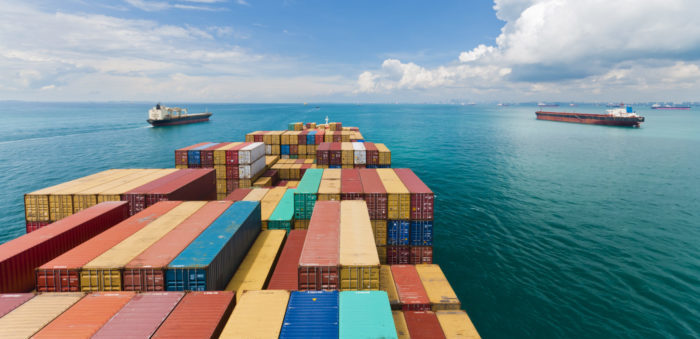Dangerous cargo hidden in just one container can destroy a whole ship if it burns or explodes at sea. Yves Vandenborn, Loss Prevention Director of The Standard Club, says a more rigorous approach to container booking is needed if shipowners are to protect their ships, crews and reputations from the real risk of misdeclared box cargoes.
Calcium hypochlorite is an important and widely used water treatment chemical. It is shipped in containers all over the world. However, it needs to be carried with care: at anything above 30°C in a confined space it can catch fire or explode.
Unfortunately disreputable shippers do not always tell shipowners they have stuffed their containers with dangerous cargoes such as calcium hypochlorite. Major recent container-ship fires, including the Maersk Seoul, Maersk Londrina, Barzan, Al Ula, Hanjin Green Earth and Cape Moreton in 2015 and the APL Austria in 2017, are all blamed on undeclared cargoes of calcium hypochlorite.
In 2016 the International Group of P&I Clubs and the Cargo Incident Notification System (an initiative of 16 shipping lines) published Guidelines for the Carriage of Calcium Hypochlorite in Containers. The idea was to clarify the increasingly complex requirements of the International Maritime Dangerous Goods (IMDG) code – and show that, when properly declared, packed and stowed, calcium hypochlorite is perfectly safe to carry in containers.
[smlsubform prepend=”GET THE SAFETY4SEA IN YOUR INBOX!” showname=false emailtxt=”” emailholder=”Enter your email address” showsubmit=true submittxt=”Submit” jsthanks=false thankyou=”Thank you for subscribing to our mailing list”]
Despite this, many liner operators now refuse to carry such cargoes or charge excessively for doing so. The result is a vicious circle: greater restrictions provide a greater incentive for unscrupulous manufacturers and shippers to commit fraud in order to export their products – and they are getting very good at it.
Industry research suggests that at least 2 million TEU each year are now likely to contain an undeclared dangerous cargo. A ship carrying one of these containers will not have taken any special precautions, and is at risk.
The results can be catastrophic, including injury or death of seafarers, extensive damage or total loss of the cargo and ship, and pollution of the environment. While such losses may be insured, the ship operator cannot undo the suffering caused to crew members or recover lost time, uninsured amounts and, above all, loss of reputation.
The Standard Club’s research shows that the booking process accounts for a large percentage of misdeclared dangerous cargo incidents. Improvements to booking procedures can therefore significantly help identify and prevent misdeclared dangerous cargoes from being accepted for carriage.
As a starting point, all booking office staff and agents need to know and trust their customers. This means doing due-diligence checks on new customers and their supply chains – particularly if the cargo is from China, where most cases of misdeclared dangerous cargoes originate.
In the case of slot charterers and freight forwarders, booking staff need to know and trust the checks these organisations use on their own customers. The commercially sensitive nature of the consortium and slot charter business usually means cargoes are confidential – which is like being asked to carry someone’s locked suitcase onto an aeroplane. As such the due diligence processes of slot charterers must be regularly audited and approved.
It is also vital for ship operators to have a robust and reliable container booking process throughout their organisations to keep misdeclared containers off their ships. This includes booking deadlines, cargo documentation checks, final bill of lading cross-checks, and referral processes for suspicious bookings. They should also consider the use of checking software such as Hapag-Lloyd’s Cargo Patrol.
Finally, all booking staff and agents, not just those on the dangerous cargo desk, should be comprehensively trained in dangerous cargoes, know-your-customer procedures and the booking process to ensure everyone is aware of what to look out for. They should also be kept up to date on the latest trends and regulations, and incentivised to spot misdeclared cargoes.
While every company has a different approach to booking as well as different commercial priorities and constraints, the key is to identify and close as many loopholes as possible which could be exploited by fraudulent shippers. The Standard Club’s publication, better box booking, explores these suggestions further.
By ensuring all booking office staff and agents know about dangerous cargoes such as calcium hypochlorite, as well as knowing their customers and rigorously checking all booking documentation, the chances of loading one of the two million misdeclared containers shipped every year will be significantly reduced.
By Capt. Yves Vandenborn, Director of Loss Prevention, The Standard Club
The views presented hereabove are only those of the author and not necessarily those of SAFETY4SEA and are for information sharing and discussion purposes only.

































































